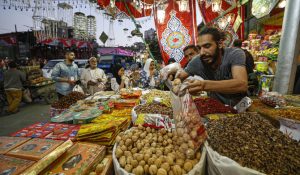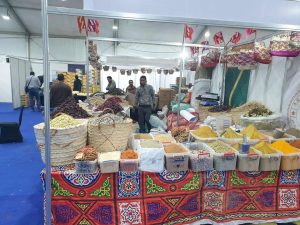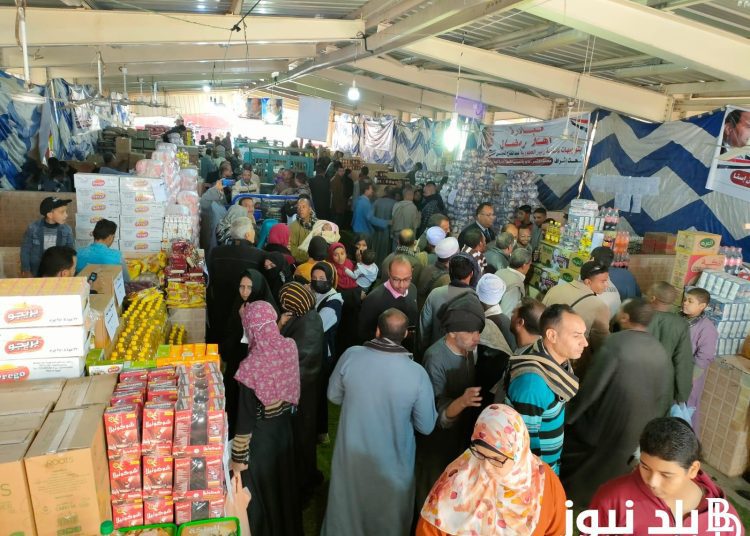The government is working to secure discount deals with major food producers and global suppliers for bulk orders during the holy month of Ramadan.
Among items on Cairo’s shopping list is yameesh, a variety of nuts imported from Syria and other Levant countries used in Egyptian iftar dishes.
“We are intensifying efforts to search for local and global companies to provide large quantities of various food items, especially Ramadan dried nuts, at reduced prices in preparation for the holy fasting month of Ramadan,” a source at the Ministry of Supply and Internal Trade, said.
This is in addition to the ministry providing meat and poultry products in large quantities keeping in view the increased consumption rates of goods and meats during the holy month, the source added.
“The ministry has coordinated with the governorates to establish ‘Hello Ramadan’ tents and exhibitions nationwide to offer goods at lower than market rates,” according to the source.
Food industry expert, Gamal Fahmy, said: “There will be co-ordination to provide mobile vehicles loaded with food items and fresh and frozen meat products for citizens in squares and places where consumer outlets are not available.
“The government is trying to control prices. Authorities have intensified regulatory campaigns to confront any violations that may harm consumer rights.
“Police vehicles will patrol the markets to ensure that traders comply with the rules, and tickets will be issued to violators. Citizens cannot bear any potential price increases during the holy month,” according to Fahmy.
“The state has imported 250,000 tonnes of raw sugar for the benefit of government-linked entities, where the sugar is refined and made available at consumer outlets and branches of affiliated companies spread across the country, to be sold at reduced prices,” a senior official at the Ministry of Supply said on condition of anonymity.
“This is part of the government’s plan to bolster the strategic stock of sugar” he said.
“The ministry is also planning to buy large quantities of cooking oil to provide it at reduced prices. It is working to offer all basic goods with a secure strategic stock that meets the needs of citizens for long periods.
“Ramadan exhibitions will be held in every governorate, and their aim is to increase the availability and supply of food products and goods,” the official added.
Tamer Salah, deputy minister of supply and internal trade in Luxor Governorate, said that the directorate was monitoring the implementation of the Ahlan Ramadan exhibitions.
The exhibitions mandate the display of final sale prices of products and goods to consumers, including taxes and financial charges, in Arabic.
Prices should be clearly visible and in non-removable writing, Salah said.
Businesses are required to inform both the Ministry of Supply and Internal Trade and the permanent technical secretariat about any modifications to final sale prices for any product or good, he added. “I believe these procedures, as well as the Ahlan Ramadan exhibitions, will contribute to reducing prices.”


Storing basic goods for fear of high prices
Meanwhile, many people have resorted to storing goods in the face of continuous price hikes, making a difficult situation more challenging.
With commodity prices hiking by up to 50 per cent since the beginning of the year, Egyptians are changing their consumption patterns, resorting at times to hoarding staples — rice, sugar, flour, and cooking oil — in a bid to save money amid prices that are surging on a near weekly and sometimes daily basis.
Emad Qenawi, head of the Importers Division at the Cairo Chamber of Commerce, said the current global crisis was affecting the production and transportation of goods, also impacting the quantities offered and their prices.
While the public should regulate their consumption, vendors should not price their goods based on expectations as a result of the crisis, but rather on the price of production in addition to their normal margin, he said.
There was a need for merchants to shoulder their responsibilities in exceptional times, Qenawi added.
The Welcome Ramadan initiative is making available commodities at competitive prices at more than 1,000 outlets nationwide.
The Islamic month of Ramadan is one of fasting, but it is also one of heavy food consumption. In the past, Egyptians have welcomed Ramadan by stockpiling large amounts of food and beverages, which accounted for a noticeable surge in food consumption during the ninth month of the Islamic calendar, and thus a surge in spending on foodstuff.
“The price spike has caused a significant slowdown in market activities,” Magdi Tawfiq, deputy head of the herbs section at the Cairo Chamber of Commerce, told The Egyptian Mail.
“People are either buying smaller amounts, compared to the past years, or not buying anything at all.”
Meanwhile, Prime Minister Moustafa Madbouli last week presided over a cabinet meeting to review preparations for the holy month of Ramadan.
Discussions focused on efforts to ensure the availability of goods for the festive season.
Goods must be available and prices controlled since the government is currently paying much attention to the latter, the premier said, adding that a committee comprising ministers and high-ranking officials has been formed to oversee price controls.
The prime minister also instructed the formation of a working group in each governorate, headed by the governor, to follow up availability of commodities on local markets and price controls, on which a weekly report will be submitted to the prime minister.

Agreements have been made with chambers of commerce and manufacturers to put large quantities of goods on the local market during the fasting month of Ramadan, which will help balance prices, the prime minister said.
The Welcome Ramadan and We Are All One initiatives are currently being expanded to ensure the availability of various commodities at affordable prices.
The government is in co-ordination with the authorities concerned to set up fairs, open static outlets and dispatch mobile outlets affiliated to the Ministry of Supply and Internal Trade, the Ministry of Interior, the National Service Projects Agency of the Armed Forces, and the Ministry of Agriculture.
Mobile outlets are distributed within the governorates to meet the needs for goods in areas of high population density.
Minister of Supply and Internal Trade Ali el-Meselhi, said that in the course of communication with the governorates and chambers of commerce, personnel and outlets have agreed upon to make various goods available.
Minister of Agriculture and Land Reclamation el-Sayed el-Qoseir said his ministry has more than 270 outlets in the governorates, in addition to mobile outlets.






Discussion about this post